*This post may contain affiliate links. Read more »
This Korean cucumber salad recipe is a well-tested masterpiece of tasty simplicity. Every time I take a bite of some of these spicy Korean marinated cucumbers over some kimchi fried rice, I think to myself how crazy it is that people don't eat more veggies. Because, dang it, these are super good tasting, effortless to make, and great for you too!
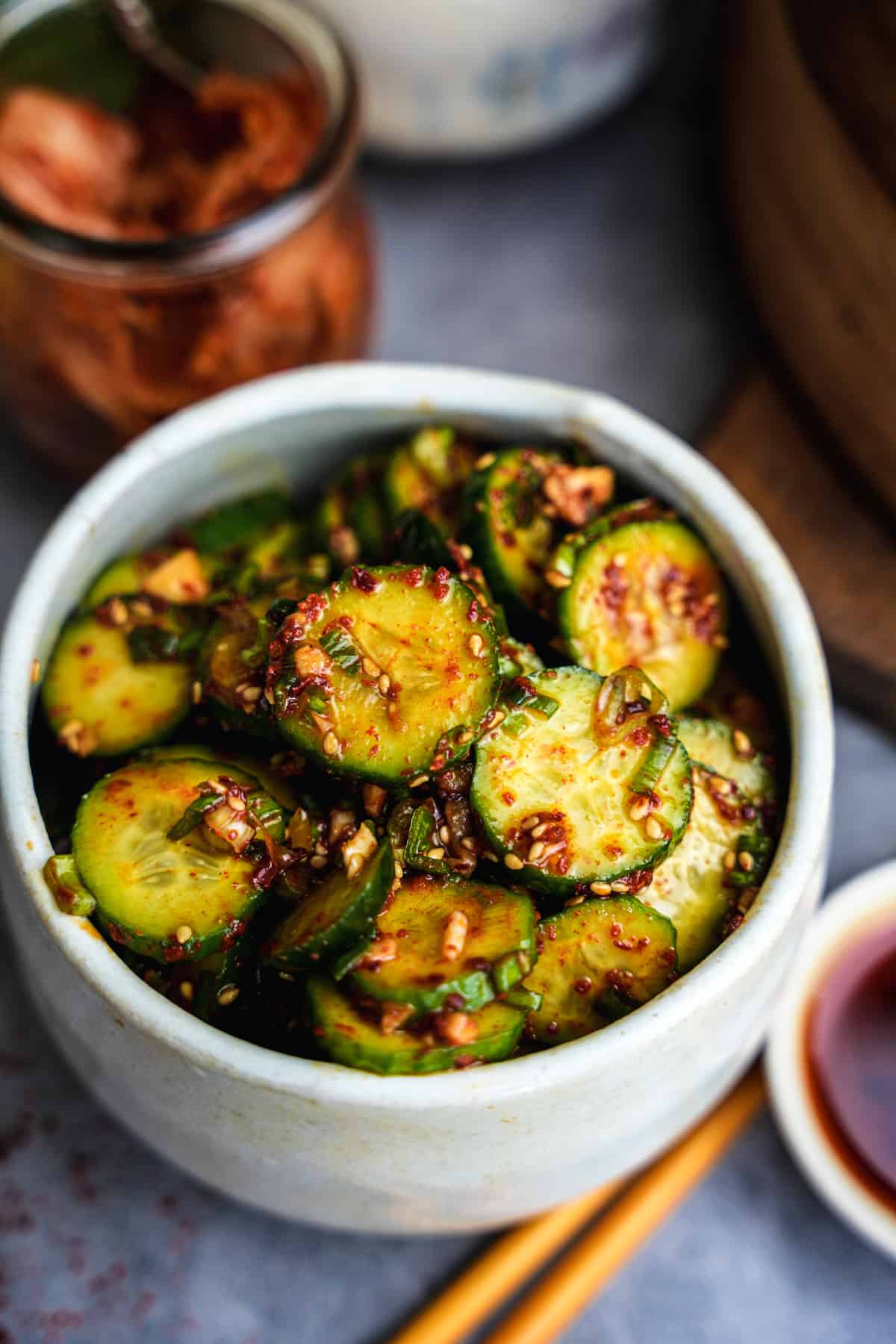

Enter your email & I'll send it to your inbox. Plus, get great new recipes from me every week!
By submitting this form, you consent to receive emails from Cinnamon Snail.
Like my essential recipe for vegan kimchi, this oi muchim recipe is a killer component for sanchae bibimbap, and even makes an amazing condiment for vegan fried chicken glazed with Korean bbq sauce. I serve it all the time as a side for my seitan bulgogi or ketoprak.
So, grab a sharp knife and explore the wonders of Korean cuisine through the delicious and oh-so-romantic simple cucumber salad Korean style, oi muchim. You will def. want to kiss each little cucumber slice, one by one.
Jump to:
- 🥰Why this is the best Korean cucumber salad recipe
- 🌶️ Ingredients for Korean cucumber salad
- 🤯Variations
- 📖 How to make this easy korean cucumber salad
- 💡Here's what to serve spicy Korean marinated cucumbers with:
- 🤷♀️Recipe FAQs
- ✌️These go great with this Korean cucumber salad recipe:
- Korean Cucumber Salad (Oi Muchim)
🥰Why this is the best Korean cucumber salad recipe
👉Easy and lightning-fast to make: With no cooking required, this pickled cucumber salad recipe is incredibly easy and fast-as-heck to prepare. You can have it ready to serve in under five minutes!
👉Healthy: Cucumbers are low in calories, a great source of electrolytes, and high in water content, making this Korean cucumber banchan salad a healthy and refreshing dish. This recipe also happens to be completely gluten-free and soy-free.
👉This is a traditionally plant-based dish: While SOME people do put fish paste in their oi muchim recipe, it's not even really the norm. So, you aren't doing anything scandalously untraditional by following the vegan recipe!


👩🍳 Learn to make the BEST vegan Korean food
This 5-day guide to my most popular Korean recipes is 100% FREE, & you'll love the actual heck out of it 🥰
🌶️ Ingredients for Korean cucumber salad
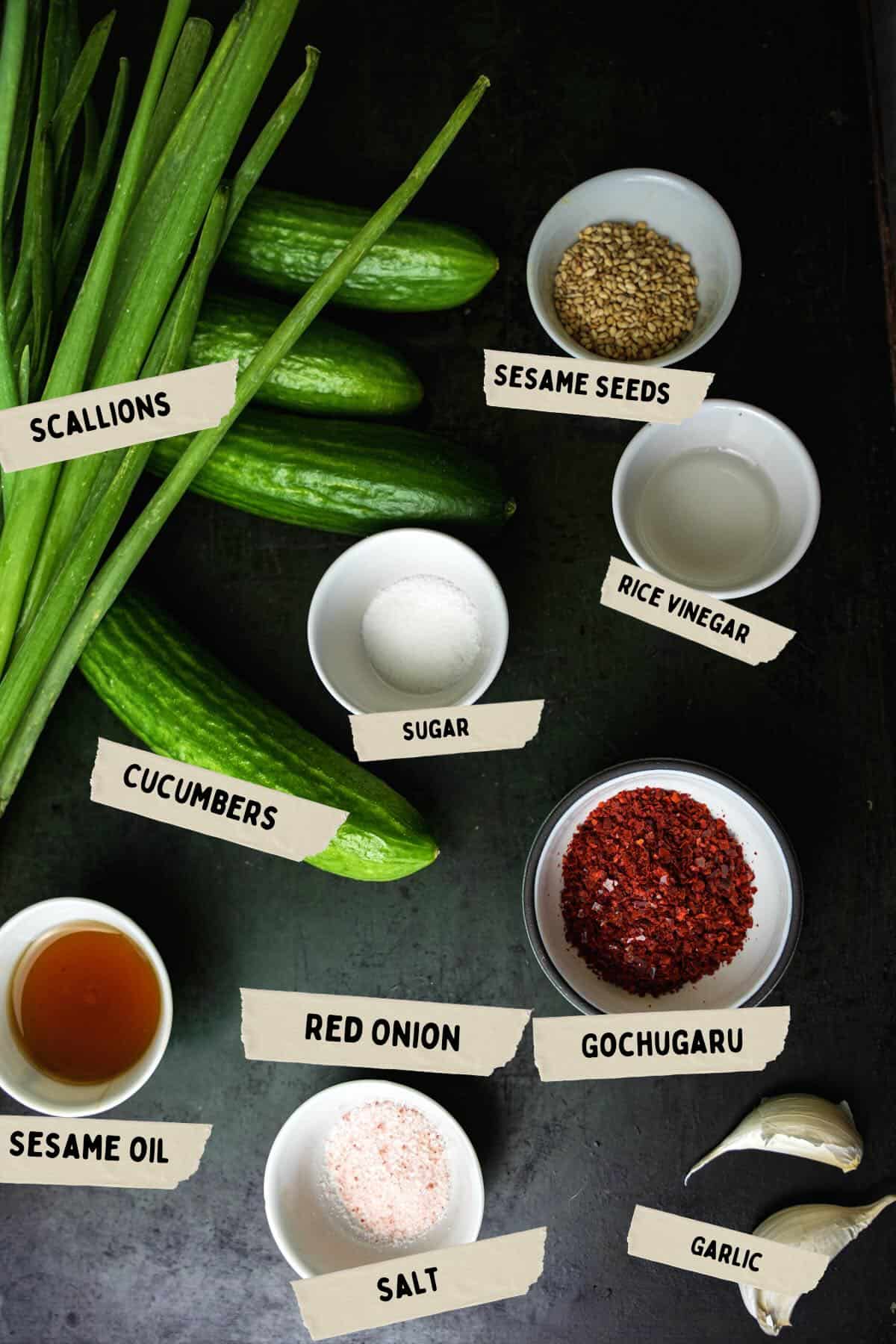
Gochugaru
Gochugaru is a key ingredient in Korean cuisine, offering medium spice and a vibrant, robust flavor. It's essential for dishes like kimchi, gochujang, and Korean marinated cucumbers like oi muchim. I prefer the coarse grade for its bolder flavor, but any grade will do, as long as it's unsalted. If you can't find gochugaru, try a blend of dried ancho and arbol chilies. De-seed them, then pulse them in a blender or food processor to create flakes. In a pinch, you can use crushed red pepper flakes, but they're spicier and less flavorful, plus they usually have seeds. Avoid any super-fine chili powder for this recipe, as the flake texture is important.
Sesame oil
Toasted sesame oil is what I recommend for this recipe. The toasting process gives it a rich, nutty flavor that really shines. If you need a substitute, perilla oil works well and has great health benefits along with a similar taste.
Cucumbers, obviously!
Korean cucumbers, also called Asian or Japanese cucumbers, are crisp, sweet, and have thin skin that doesn't need to be peeled. If you can't find them, Persian cucumbers are a great alternative, with their mild flavor and seedless texture. English cucumbers also work due to their similar crispness, but they're a bit longer and have thin, edible skin. For a stronger cucumber flavor, you can go with Kirby cucumbers, which are crunchier and more pronounced in taste.
See the recipe card at the bottom of this page for the complete list of ingredients and their quantities.
🤯Variations
Completely NOT spicy Korean cucumber salad?
Simply leave out the gochugaru if you hate spicy stuff! The crisp cucumbers with sesame oil and other seasonings are still absolutely lovely. Or rock out my Filipino ensaladang pipino recipe and just leave out the bird's eye chilies.
Japanese cucumber salad
Sunomono is Japan's version of this same kind of salad. The flavors are a little more subtle. Lighter, more citrusy. Who knows? It might just be your vibe.
Thai cucumber salad
With hints of tamarind, bird'e eye chilies and crushed peanuts, my Thai cucumber salad recipe is equal parts refreshing and hyper-fun and flavorful.
Cucumber beet salad
With mint, red onions and za'atar, this Middle Eastern cucumber beet salad is practically a whole meal on its own.
📖 How to make this easy korean cucumber salad
You wanna see how this easy, yummy Korean cucumber banchan gets made? I will show you how it should look every step of the way. Or you can follow along with the easy-to-print recipe card towards the bottom of this page.
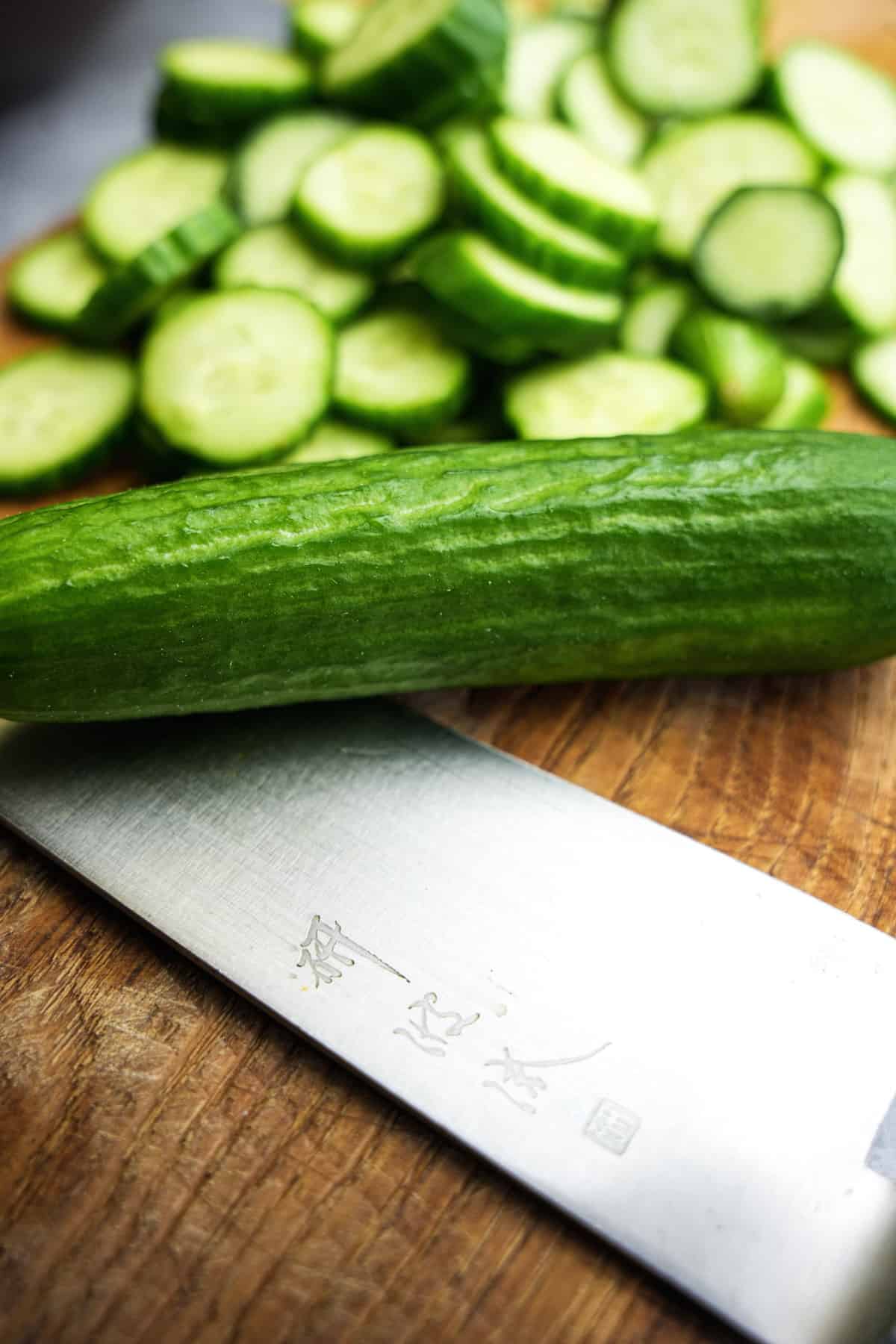
Step 1
Rinse the cucumbers under cold running water, and then pat them dry with a clean kitchen towel or paper towels. Cut the cucumbers into ¼ inch (about 6 mm.) slices.
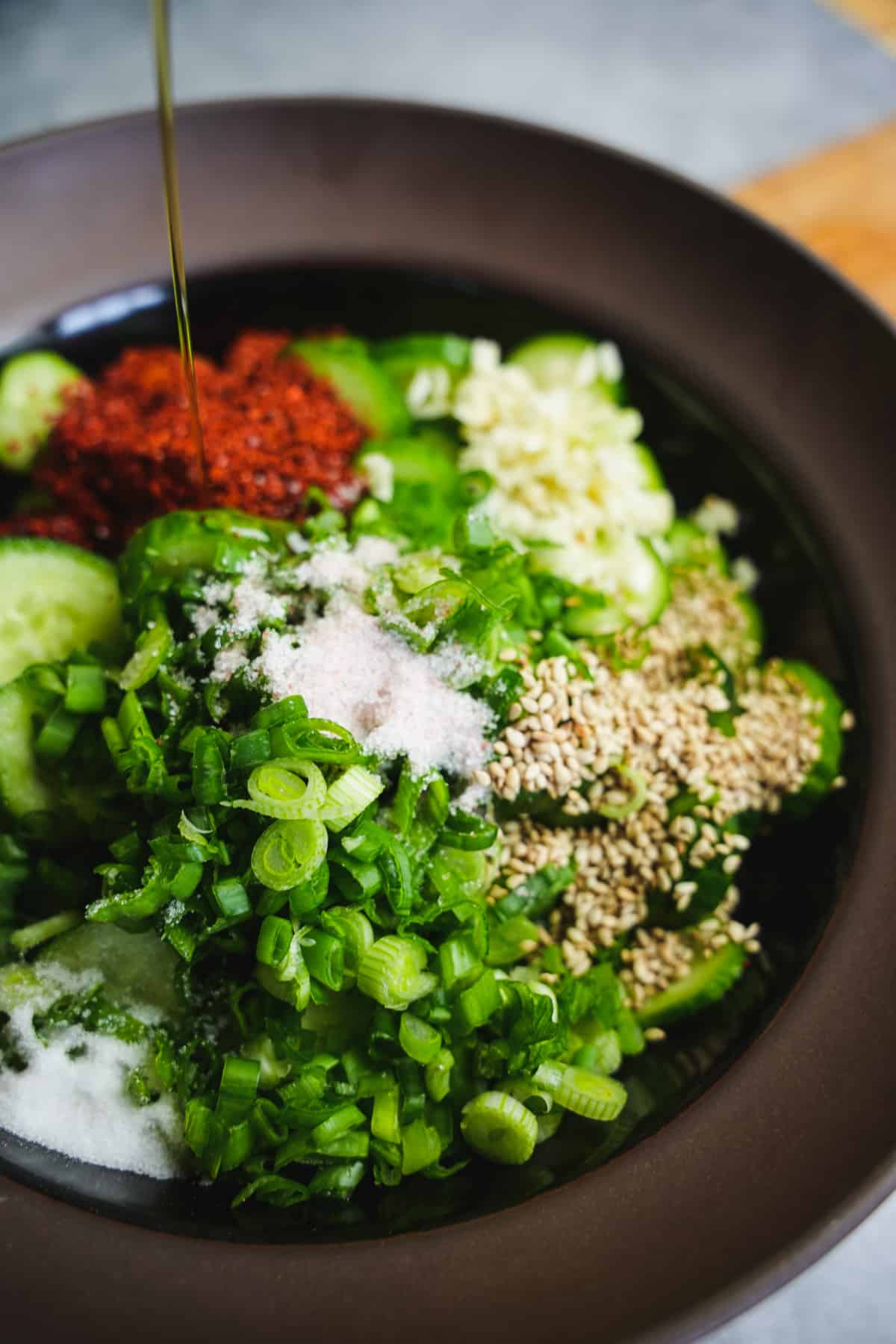
Step 2
Place the sliced cucumbers in a bowl with the remaining ingredients.
Step 3
Squeeze and massage the cucumbers by hand so that the ingredients become thoroughly mixed and the flavors begin to penetrate the cucumbers.
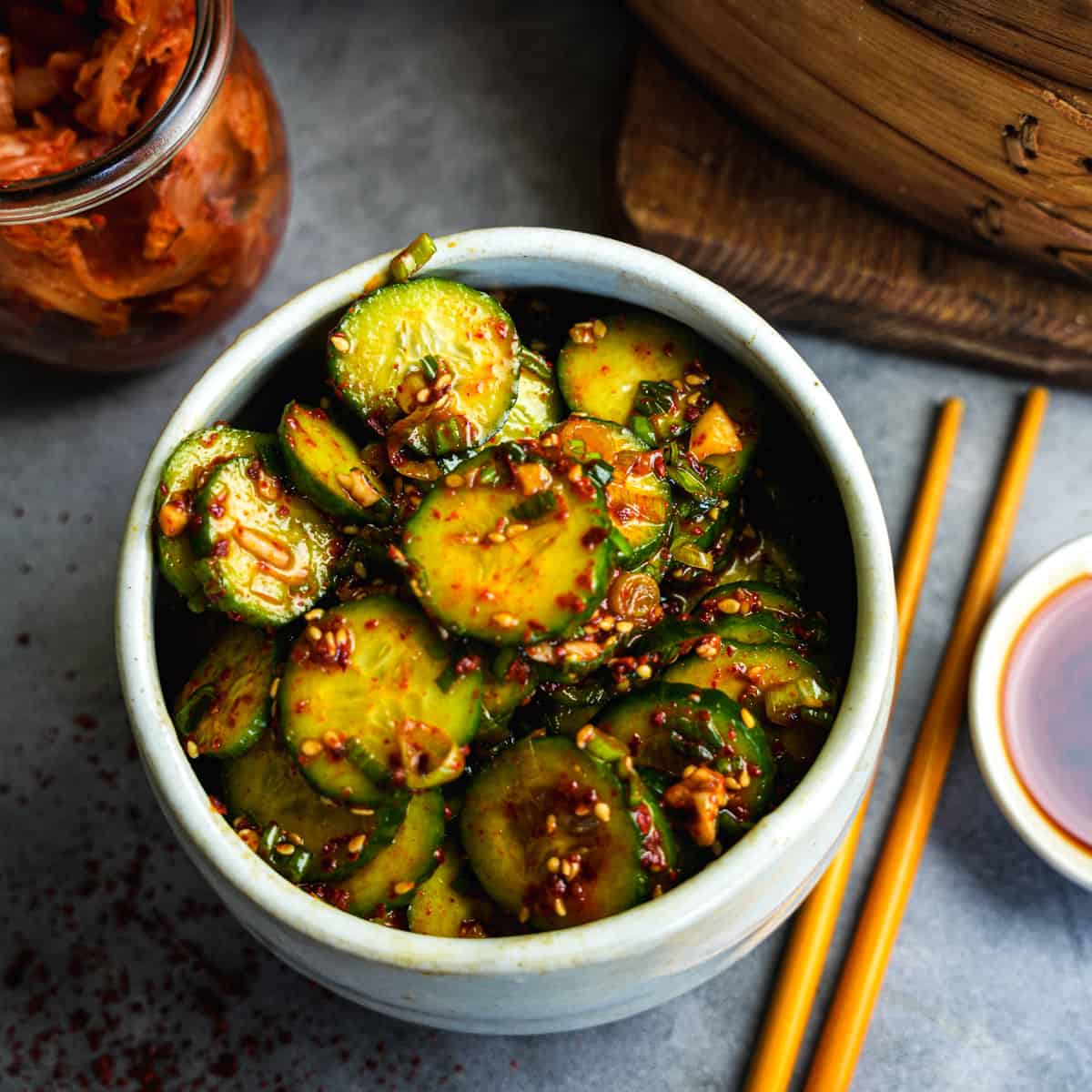
Serve the salad immediately or chill for an hour and serve the dish cold. Revenge is a dish best-served cold. Cucumber revenge is even better with a bowl of vegan Korean tofu soup!
💡Here's what to serve spicy Korean marinated cucumbers with:
What are some less obvious companions to oi muchim recipe that my family and I love? My kids can't get enough of it as sides to tahu goreng, and my vegan tofu katsu!
Use these Korean marinated cucumbers to freshen up a noodle dish such as pad woon sen, bami goreng, mee rebus, mie goreng, or ketoprak.
You can also use this pickled cucumber salad as a delightful upgrade from regular cucumber pickles to put all over your favorite sandwiches like my oyster mushroom shawarma, or vegan kofta on freshly baked Arabic pita bread!
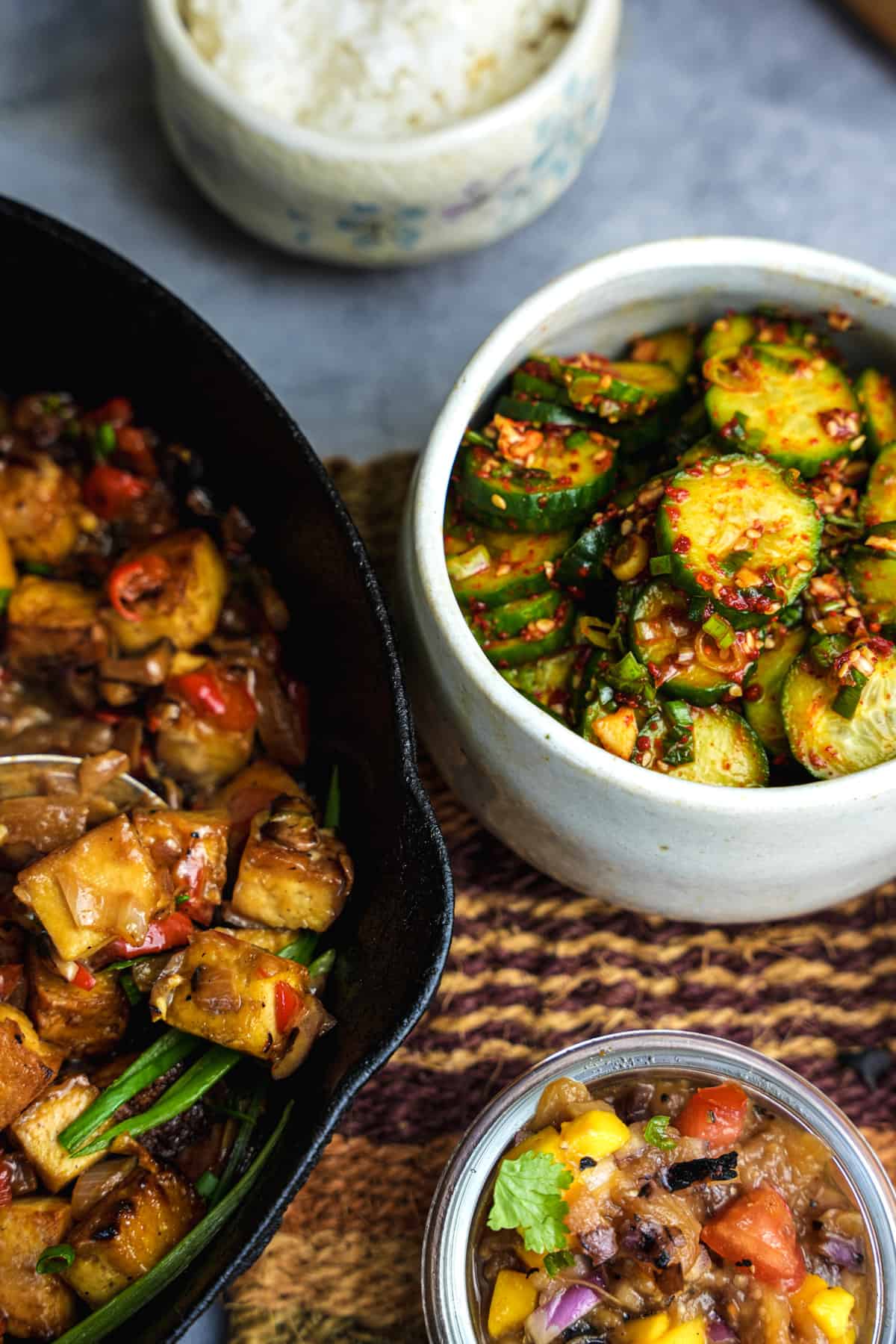
Korean cucumber salad is a popular side dish or Korean cucumber banchan. Probably the most famous banchan is kimchi, and here is my kimchi recipe with just ten ingredients! It is often served as a refreshing and crunchy accompaniment to main meals. Often it is served with Korean barbecue, where the refreshing raw salad contrasts the cooked meats. Of course, if you are vegan, you can still make Korean BBQ!
🤷♀️Recipe FAQs
Here are some tips for picking out the crispest cucumbers:
Look for cucumbers that are firm and evenly colored, without any soft spots, bruises, or wrinkles. Avoid cucumbers that are overly shiny, as they may be coated with wax to extend their shelf life.
Choose cucumbers that are relatively straight and have a consistent diameter from end to end. Cucumbers that are too curved or have irregular shapes may indicate uneven growth or uneven ripening which can affect their texture.
Press gently on the ends of the cucumber with your fingertips. A fresh cucumber should feel firm and not give too much. If it feels mushy or overly soft, it may be a sign of a waterlogged or overripe cucumber.
Check the color of the cucumber's skin. Ideally, it should be a vibrant green color without any yellowing or browning. However, some cucumber varieties may have naturally paler or mottled skin, so it's important to consider the specific type of cucumber you're selecting.
Smell the cucumber. A fresh cucumber should have a mild, fresh scent. If it smells sour, musty, or off, it may be a sign of spoilage.
If possible, choose cucumbers that are sold without plastic wrap or excessive packaging, as this can trap moisture and lead to a loss of crispness.
By following these tips, you can select the crispest cucumbers for your Korean cucumber salad or any other dish you're preparing.
Oi Muchim and Oi Saengchae are both Korean banchans (side dishes) made with cucumbers. Sometimes the terms are used interchangeably, but they sometimes differ in their preparation, flavor profiles, and textures.
Preparation: Oi Muchim is a seasoned cucumber salad that is typically made by thinly slicing cucumbers and marinating them in a mixture of seasonings such as soy sauce, vinegar, sugar, sesame oil, and red pepper flakes. It is often garnished with sesame seeds and sometimes with garlic or onions. On the other hand, Oi Saengchae is a fresh cucumber salad that is made by julienned cucumbers mixed with seasonings like vinegar, sugar, salt, and sometimes garlic, without any marination time.
Flavor profiles: Oi Muchim has a savory, slightly sweet, tangy, and slightly spicy flavor profile due to the combination of soy sauce, vinegar, sugar, and red pepper flakes. The sesame oil adds a nutty aroma to the dish. Oi Saengchae, on the other hand, has a fresh, tangy, and slightly sweet flavor from the vinegar and sugar, with a crisp texture from the raw cucumbers. It often has a milder taste compared to Oi Muchim.
Textures: Oi Muchim typically has softer cucumbers due to marination, or brining, and the seasonings infuse into the cucumber slices, making them more tender and flavorful. Oi Saengchae, being a fresh cucumber salad, has a crisper and crunchier texture as the cucumbers are typically julienned or thinly sliced and not marinated, allowing them to retain their natural crunchiness.
Korean cucumber salad can typically stay fresh for up 2-3 days in the refrigerator if stored properly. To store the salad you should transfer it to an airtight container or cover the mixing bowl tightly with plastic wrap before placing it in the refrigerator.
It is important to note that the longer the salad sits, the more it will release liquid, making it softer and less crunchy. Therefore, follow these steps if you intend to make this in advance and not eat it for a day or two:
After you cut the cucumbers, place them into a colander in your sink.
Sprinkle the cucumbers with salt and allow them to sit for 20 minutes. The salt will start to draw extra moisture out of the cucumbers.
Rinse the cucumbers thoroughly under cold running water until you have gotten rid of all the salt.
Dry the cucumbers on a kitchen cloth, and then mix them with the remaining ingredients.
If you follow those steps, your salad with not release as much liquid as it sits for a couple of days.
In traditional Korean cucumber salads, various types of fish or seafood products are sometimes used to add umami flavor. These can include:
Salted Shrimp (Saeujeot), Fish Sauce, Anchovies (Myeolchi), and Oysters (Gul).
These ingredients are not used in this vegan Korean cucumber salad. I wouldn't say that not using animal-based ingredients makes this Korean cucumber salad recipe like some kind of phony garbage. Instead I would say it makes this recipe one that both humans and sea creatures will both love very dearly.
✌️These go great with this Korean cucumber salad recipe:
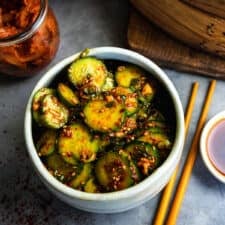
Korean Cucumber Salad (Oi Muchim)
Equipment
Ingredients
- 4 Korean cucumbers or other 4-5 inch long cucumbers such as English, Persian, or Kirby
- ¾ teaspoon salt or to taste
- 2 scallion or green onions thinly sliced
- 2 cloves garlic minced
- 4 ½ teaspoons gochugaru Korean red pepper flakes
- 1 teaspoon rice vinegar
- 1 tablespoon sesame oil
- 1 ½ teaspoons sesame seeds
- 1 ½ teaspoons sugar
Instructions
- Start by rinsing the cucumbers thoroughly under cold running water to remove any dirt or debris. Then, gently pat them dry using a clean kitchen towel or paper towel.
- Use a sharp knife to cut the cucumbers into slices that are approximately ¼ inch thick or about 6 mm in size.
- Transfer the sliced cucumbers into a bowl along with the remaining ingredients.
- Using your hands, give the cucumbers a gentle squeeze and massage them to ensure that all the ingredients are mixed thoroughly and the flavors begin to penetrate the cucumbers.
- You can either serve the salad immediately or chill it in the refrigerator for about an hour to allow the flavors to meld together. If you prefer a cold dish, serve it chilled.
Notes
Important note about storage:
If you intend to make this salad in advance and store it for more than one day, follow these steps so that the salad doesn’t become too watery.- After you cut the cucumbers, place them into a colander in your sink.
- Sprinkle the cucumbers with salt and allow them to sit for 20 minutes. The salt will start to draw extra moisture out of the cucumbers.
- Rinse the cucumbers thoroughly under cold running water until you have eliminated all the salt.
- Dry the cucumbers on a kitchen cloth and then mix them with the remaining ingredients.

Enter your email & I'll send it to your inbox. Plus, get great new recipes from me every week!
By submitting this form, you consent to receive emails from Cinnamon Snail.




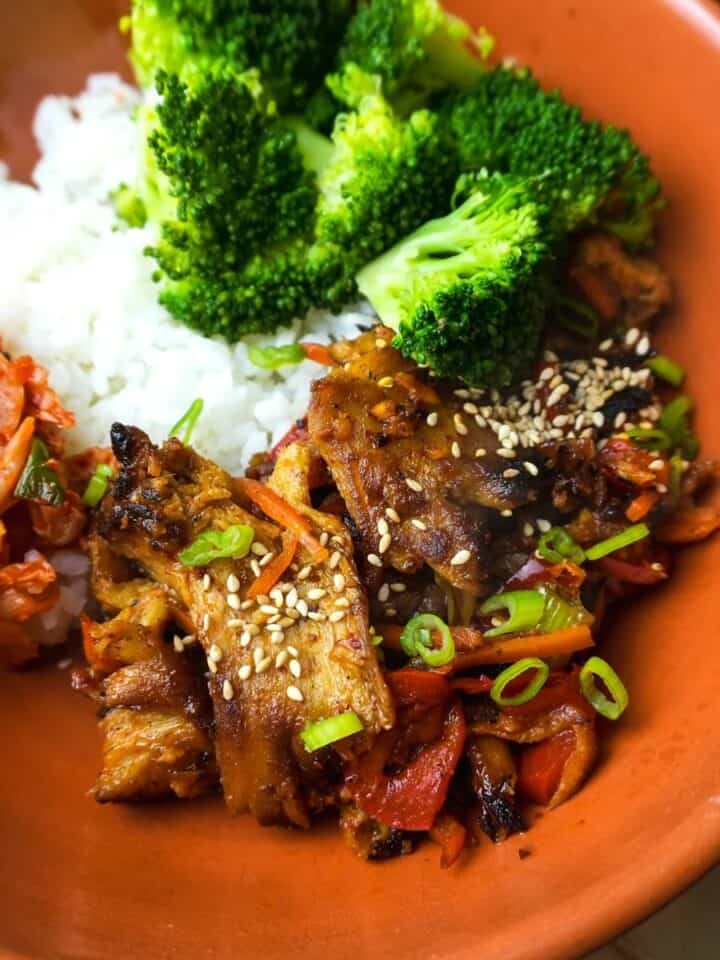

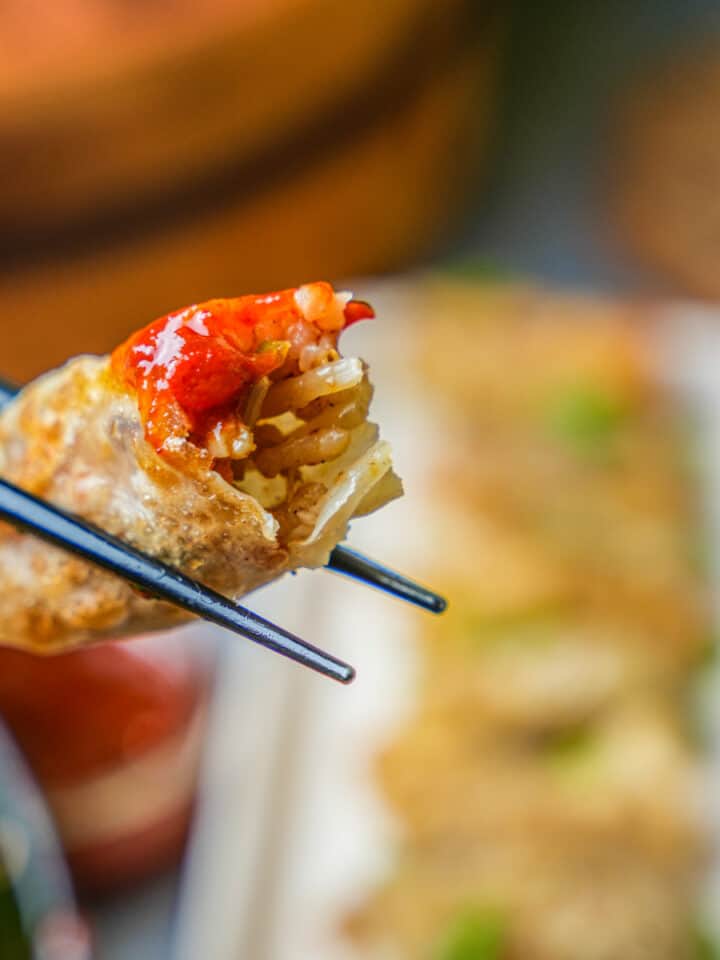
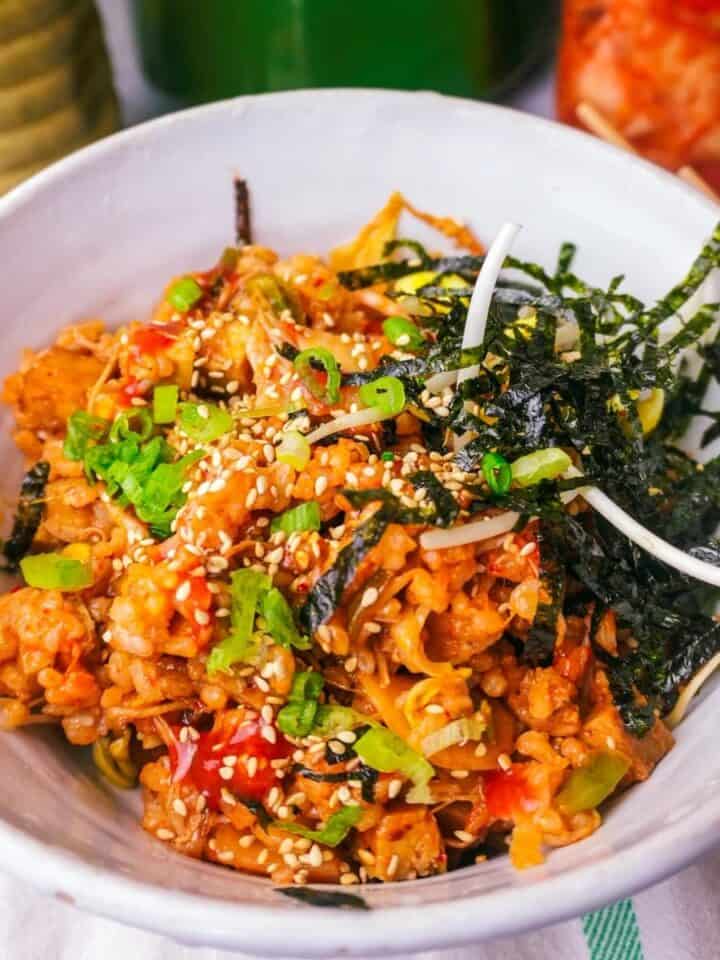






Nancy Klotz says
There was a sale on Persian cucumbers so I had to make this. SO delicious . It is absolutely addictive. I think I'll have to get more tomorrow!
Cathy says
Love the sweet spiciness of the sauce with cucumbers
Marna says
Crisp Persian cucumbers dressed with gochugaru, rice vinegar, sesame oil and sesame seeds, just the right amount of sweet...ready in minutes... what else could you want? I will be making this often. My guys loved it with the Korean Braised Tofu...again no leftovers!
Paige Davis says
I made this last night to round out our Korean-inspired dinner. It's so hot outside right now and a cold cucumber salad sounded--and was--delicious. I am learning so much about regional flavors and how minor tweaks to a recipe can make a fun difference since following Chef Adam and trying several recipes. There are a lot of recipes/ food bloggers on the internet and I love that I can trust Cinnamon Snail to deliver recipes that work and don't let me down. This salad was fun to make--I don't often think about massaging cukes but that's all changed now lol. So easy and yummy!!
Allison says
These Korean cucumbers are the bomb!! I had never had gochugaru before. So I immediately ordered some from Amazon and anxiously waited. The day it arrived I made the recipe. It never made it to the fridge. I tasted it and proceeded to eat the entire recipe (all 4 servings) for my lunch! Lordy it was good! There was extra sauce left over in the bottom of the bowl. So I put some cubed tofu in there to marinate until dinner. Oh Lordy, it was good too!!! There is no stopping me now! I will be making this CONSTANTLY! Thank you for this recipe!
Adam Sobel says
Super glad you love it Allison! Now that you have gochugaru in your life you need to mess with my kimchi recipe next!
KRB says
Tried this first as a way to use up some little cucumbers before they went bad, but now i've made it several times and love the spicy sweetness with the cool cucumber crunch. I love recipes like this that make a meal feel more complete, or quickly and easily elevate the boring main dish I threw together in a rush on a busy weeknight!
Adam Sobel says
Love that you love this one! I am all about it as both a standalone meal, as a condiment to vegan KBBQ stuff, or even on vegan burgers. It's so versatile, right?
HG says
Looking forward to cucumber season in the garden, when I will make it on a weekly basis to use up all those extra cukes.
Michele says
Delicious and so easy to make. It stayed nice and crunchy in the fridge and I couldn't stop nibbling on them.
Pam says
This recipe was easy to put together and was excellent.